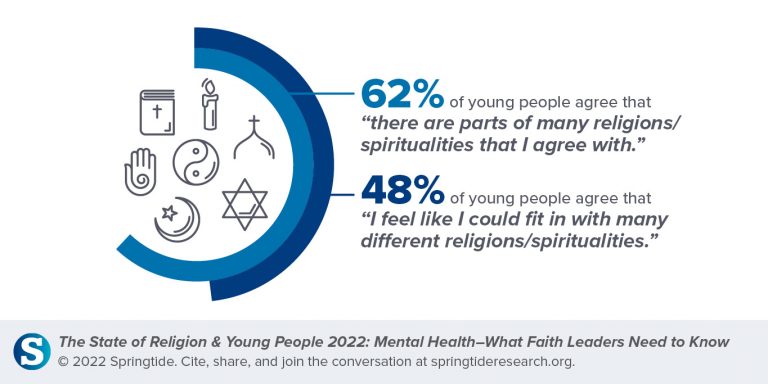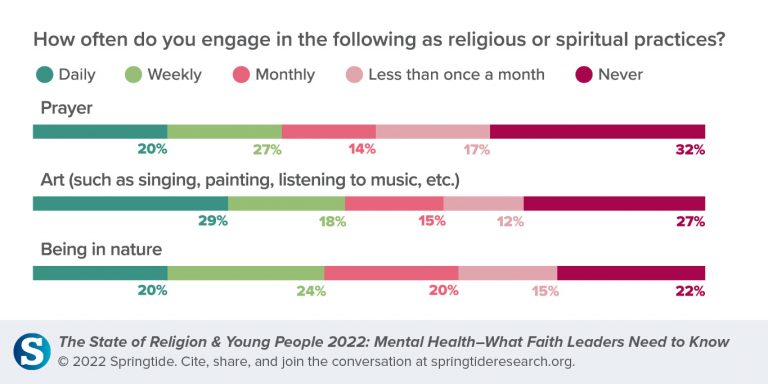
An Inside Look at Gen Z’s Spiritual Practices
A question we frequently hear at Springtide is “why don’t young people want to come to church?” Our data does show many young people don’t attend religious services regularly, that doesn’t mean they don’t consider themselves religious or spiritual. In fact, 68% of the young people we surveyed in 2022 identified as religious, and 77% claimed to be spiritual. It’s not that young people are disinterested in religion or spirituality, but they do tend to be skeptical of traditional religious institutions – it can be a challenge to draw them in and keep them there.
And that may be because many Gen Zers resonate with parts and pieces of different religious and spiritual traditions and can see themselves fitting in with them.

They are explorers by nature and enjoy the freedom of investigating a number of beliefs and practices to see what feels right for them – and they do this on a regular basis. More traditional practices like prayer remain favorites for Gen Z, but they’re just as likely to consider being in nature, doing art, practicing yoga or volunteering as ways to connect spiritually.

We call Gen Z’s approach to religious and spiritual practice Faith Unbundled, which is a term that describes the way they construct their faith by combining elements such as beliefs, identity, practices and community from a variety of religious and non-religious sources, rather than receiving all these things from a single system. Young people partake in beliefs and practices to the degree that suits them, without formal commitment.
Hear from the young people we surveyed on how religious and spiritual practice looks like for them:
“So what I typically do is go to a peaceful area…like [Linn Run State Park]…I’m listening to the water and kind of just like breathing in, breathing out, really closing my eyes and connecting myself to the sounds around me and really centering my emotions and grounding them…really relaxing the body and the spirit. And then sometimes I put in my headphones and I look on Google or YouTube for meditation videos. And then I just really follow along to the illustrations of the video and what the instructor is telling you to do. That's how I meditate.”
– Parker, 21
“And in the moments in church when I've felt closest to God – [there were] certain masses that have an accompanist. And whether it was a harpist or a flutist, during those moments of silence and when [the music] comes in, then that I feel very connected and amazed. So sometimes like I feel playing music can get me closer to that divine feeling.”
– Daniel, 21
“I'm really into the contemplative religious traditions and I got into that first through my Roman Catholic tradition and contemplative Christianity. But since then I've explored…contemplative spirituality, some in more Eastern traditions, the Jewish tradition, mysticism, Islam, and other contemplative traditions.”
– Josh, 22
"I think it makes me feel smaller when I look around outside. I like sitting and looking at trees and looking at birds and looking at the grass and all of the little bits of ecosystem around me and just animals and things in life existing in and unbothered by my own issues…Just take a walk, breathe, read outside. Things are much bigger than you and your own problems."
– Araceli, 25
Interested in learning more? Download our free report to get key characteristics, trends, and demographics about 13-year-olds and Generation Alpha.



